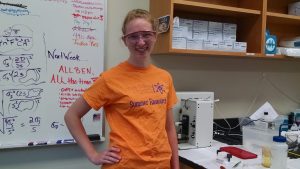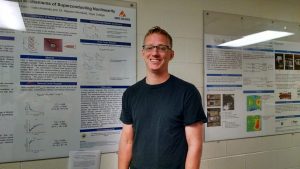 Exploring the Effects of Copper on Composition and Charge Storage of Prussian Blue Analogue Pseudocapacitors
Exploring the Effects of Copper on Composition and Charge Storage of Prussian Blue Analogue Pseudocapacitors
Research Advisor: Dr. Jennifer Hampton
As energy usage has increased in recent years, there has been great demand for efficient, cost-effective, and earth-abundant materials to be used for energy storage. The ability to produce hexacyanoferrate (HCF) modified nickel film for use as a pseudocapacitor has already been demonstrated. This project focuses on the effects on the modification procedure and the resulting material of adding copper to the nickel metal film. A NiCu film was deposited onto a gold substrate with a controlled potential electrolysis experiment, then was modified and characterized with a cyclic voltammetry experiment. The composition was determined with a scanning electron microscope with energy dispersive x-ray spectroscopy before and after the modification process. Copper was selectively removed in some cases as a result of the modification. With increased levels of copper, the material can become structurally unsound and result in unintentional stripping of the material. Preliminary data suggests that as the pre-modification level of copper is increased, the resulting charge storage of the HCF film increases as well.
This material is based upon work supported by the Hope College Dean for Natural and Applied Sciences Office, the Hope College Physics Department, and the National Science Foundation under NSF-MRI Grant No. CHE-0959282.



